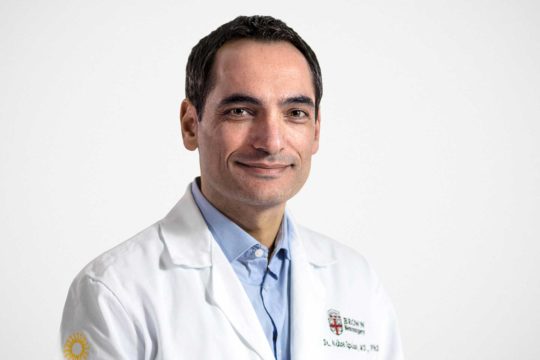The Tapinos Lab Develops Cutting–Edge Methods For Treating Brain Cancer
 Nikos Tapinos, MD, PhD, has spent more than 10 years investigating treatments for glioblastoma—often referred to as one of the deadliest cancers. And he is hopeful his persistence is getting him closer to promising new treatment options.
Nikos Tapinos, MD, PhD, has spent more than 10 years investigating treatments for glioblastoma—often referred to as one of the deadliest cancers. And he is hopeful his persistence is getting him closer to promising new treatment options.
Bolstered by a recent $400,000 gift from a donor who wishes to remain anonymous, The Tapinos Laboratory of Cancer Epigenetics and Plasticity at Rhode Island Hospital is making progress on three research projects with the potential to transform outcomes for patients with this highly aggressive form of brain cancer.
“It’s an exciting time in the lab right now because these projects represent a new way of thinking about targeting cancer,” said Dr. Tapinos, Director of Molecular Neuroscience and Neuro-Oncology Research at Rhode Island Hospital. “Basically, we’re trying to tame the tumor.”
All three of the potential therapies target RNA-based mechanisms to take away or slow down the adaptability of the glioblastoma cell. Its extraordinary adaptability is what makes glioblastoma an especially aggressive and recurrent form of cancer.
“…These projects represent a new way of thinking about targeting cancer.”
—Dr. Nikos Tapinos
The researchers at the Tapinos Lab have promising data that their therapies can make the cells “stagnant,” meaning they are unable to adapt and therefore become more treatable with chemotherapy or immunotherapy.
One possible upcoming clinical trial involves the repurposing of a pharmaceutical currently approved by the FDA for the treatment of a different neurological disorder. Dr. Tapinos also has preliminary evidence that his work may be applicable to other forms of cancer, including pediatric pontine glioma and triple-negative breast cancer.
“What’s so exciting is that the basic biology behind these fundamental processes of the cancer cells is similar to mechanisms that help shape the brain in the uterus during development,” Dr. Tapinos said.
“Catalyst funding” gifts such as this one allow Dr. Tapinos and his team of researchers to conduct innovative preparatory work in the lab, including complex RNA sequencing projects, to prepare for larger projects such as clinical trials.
Featured
